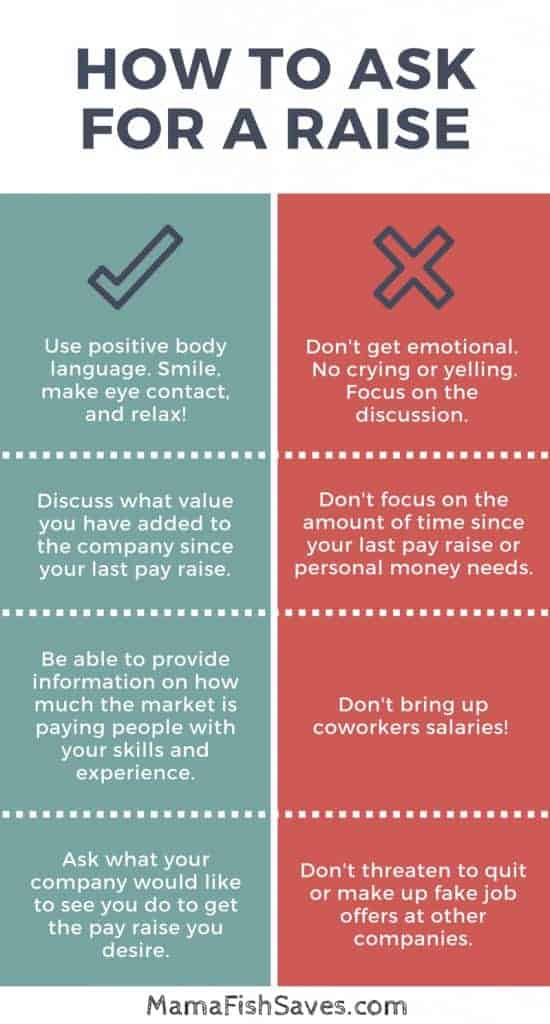 You probably need a raise, but how do you successfully ask for one? You need your job, and potentially angering your employer by seeming “ungrateful” or “argumentative” is a scary thought. In fact, more than half of U.S. employees would rather look for a new job, clean their house, get a root canal, or get audited by the IRS than actually approach their employer about a pay raise, according to a study by staffing agency Robert Half. Less than half of U.S. employees will ever ask for a raise throughout their career.
You probably need a raise, but how do you successfully ask for one? You need your job, and potentially angering your employer by seeming “ungrateful” or “argumentative” is a scary thought. In fact, more than half of U.S. employees would rather look for a new job, clean their house, get a root canal, or get audited by the IRS than actually approach their employer about a pay raise, according to a study by staffing agency Robert Half. Less than half of U.S. employees will ever ask for a raise throughout their career.
But the secret is, asking for a raise isn’t as scary as people think! According to a study by Payscale, 75% of people who actually ask for a raise get one! Over 40% get the full amount they ask for! While those odds are fantastic, you can improve them by asking at the right time and in the right way.
Here’s how you can ask for more!
Table of Contents
Know what you’re worth
What we want to earn and what we should earn are very different conversations. I would love to be paid a million dollars a year to play with my son. Unfortunately, that doesn’t add any value to my company, who is trying to earn strong investment returns to our clients.
Before setting any salary meetings, do some market research about what people with your responsibilities and skills get paid in your industry. The internet has made this process vastly easier. You can now get compensation reports by job function, region, and experience for free. Check out Glassdoor, PayScale, and Salary.com for information on pay for your job. On Glassdoor, if you are willing to anonymously put in your salary at your company, you can gain more access to things like bonus amounts, stock compensation, and experience levels.
Salaries at your company.
In general, it is not recommended to talk about pay with your coworkers. It creates animosity in what should be a teamwork environment and can cause issues with people both junior and senior to you. You may feel like your pay is too low, but the person who works the same hours as you a rung lower on the ladder won’t appreciate hearing you complain about your pay.
If you do hear that someone at your company with similar responsibilities earns more, it can motivate you to ask for a raise. However, do not bring up coworkers salaries when asking for a raise. This 100% puts your employer on the defensive instead of creating a productive discussion on how you can both get what you need.
Experience versus value.
It may be hard to hear, but doing the same job for ten years does not necessarily mean you are worth more to your company. You have to grow as an employee, taking on more responsibility and adding additional value. If in doing research on your job function, you find that your pay is actually in line with the market, the conversation doesn’t have to stop there.
If you want to be paid more, but your current job function doesn’t warrant it, set a review meeting with your supervisor. Ask what you can do to take on more responsibility or what skills they would like to see you develop. Raise your hand when you hear about other departments asking for help. Then revisit a raise discussion once you’ve started adding more value.
The power of knowing your worth.
People who don’t know their market value either don’t ask for raises or ask for far too much. A surefire way to not get a raise when you ask for one is to ask for way too much. They won’t take you seriously and will likely walk away feeling like you were wasting their time.
Remember, you are not doing your employer a favor by working for them and they aren’t doing you a favor by employing you. Employment is a symbiotic relationship and your pay should reflect that. You have to suggest a salary level that represents both the value you add to the company and the market rate for your skills. Make sure you know those things going in.
Timing is everything
Understand your company’s position.
Your company has just laid off two of your coworkers. Now you are stuck doing the work of three and really feeling like you deserve a raise! The problem is, if the company is in financial hardship, they may not be able to afford it. Asking for a raise when things seem tough won’t make you seem like a team player.
If this is the situation for you, wait until you see the company start to turn a corner. If you work on a project that saves the company money or hear that a new contract has been won, strike while the iron is hot! Schedule a meeting with your supervisor and prepare for a productive conversation.
Annual pay meetings may not be the time.
Most companies have annual performance review and pay meetings. You may meet with your supervisor, HR, and your department head to discuss the past year and the raise they plan to give you for the following year. If you and the company have had a great year, you may even get a bonus!
To many people, these meetings feel like the best time to ask for a raise. It feels like a low lift time as everyone you would need to speak to is in the room and they’ve brought up the issue of money! However, it is probably too late at this point. Your bosses have just spent a month closing out the annual financials for the business and budgeting everyone’s pay. They have already decided the salary numbers, that is why they are talking to you!
Instead, try to set a meeting about six weeks before the company usually has pay meetings. This is likely when they are already starting to have internal discussions on the budget and may be able to incorporate your request.
What if I waited too long?
If you already expect a pay raise, and then don’t receive what you were expecting in your meeting, don’t immediately express disappointment. At your annual review meeting, focus on questions about your career. What they thought you did well and what responsibilities they want to see you take on for you to get to the next level. Take the news about your pay graciously and take the time after the meeting to consider their thoughts. Then, a few weeks later, set a meeting with your supervisor. At this point, the company may need you to wait until mid-year results or the following year, but you can have a more productive discussion about the gap between what you expected and what you received.
Set a meeting in advance
Have you ever dove off a high dive or gone cliff jumping? You see others doing it and it looks like fun, so you climb your way to the top. Then as you hang your toes over the edge, your heart starts to race. Part of your starts thinking about how it really might not be so bad to just climb back down. You wanted to jump, but oh my god it’s scary and maybe your life will be just fine without this little experience. Welcome to asking for a raise.
You’ve done the research, you’ve climbed to the top, and now you need to ask the question. All this nervous energy may make you just blurt out the question in a normal meeting with your manager. It may make you walk into their office on a random Thursday, ask to speak to them for a moment and drop the bomb. This would be the ultimate belly flop.
Schedule a meeting with your direct supervisor

I would recommend starting your salary discussion with your direct supervisor. Via email or in person, ask for a meeting in the next few weeks to discuss your responsibilities and compensation. Include your responsibilities in the discussion topic so they feel you are thinking about the team as well as yourself.
Be honest about what the meeting topic. Don’t just say “to discuss a raise” or give in to the temptation to just ask for a “catch up”. You want your supervisor to have time to prepare. They may want to review your pay versus peers, check your last performance review, or talk to HR. This makes the conversation productive and fair.
The reason I recommend starting with your direct supervisor, instead of going right to the top, is that you are most likely to get a raise when you have a manager who will go to bat for you. Take the time to have an honest discussion with your supervisor and get them on your team. Most likely they have the best relationship with you and will be most open to the conversation.
Now that the date is set, decide what you are going to say.
Prepare your case
Imagine for a moment that you are an employer and someone walks into your office to discuss a raise. What way would you prefer they started off?
1 – “I have been here for three years now and…”
2 – “I know the timing isn’t great but my daughter just got into college and…”
3 – “I really enjoy my work at this company. I feel like I have grown a lot in the past year. I have started taking responsibility for…”
4 – “I just found out David, who has only been here a year, makes…”
If you selected number 3, you are like most managers and employers. Numbers 1 and 4 put people on the defensive. Number 2 invokes sympathy but isn’t at all related to the company or your pay.
How you phrase your request, whether or not you have the information to back it up, will likely determine if you actually get your raise. Remember to stay calm and positive, focus on your responsibilities and skills, and don’t make veiled threats about leaving.
Body language
You set this meeting, and your manager is going to expect you to run it. Consciously or subconsciously, they are going to pattern their response off of your behavior. Make sure you stay calm and positive.
One way to prepare yourself is to spend the five minutes before the meeting “power posing”. Power posing is standing up, good posture, with your chest out and hands on hips. Basically, in the bathroom or your office, stand for five minutes as you would imagine Superman standing! This might feel ridiculous, especially for women who are taught more passive body language styles as kids. However, a study by Harvard Business School in 2012 found that it actually works! Study participants who power posed before having to make a 5-minute speech detailing their strengths and why a company should hire them were rated both more likable and more likely to be hired.
Prior research has also shown the benefits of certain body language in negotiations. It has been discovered that smiling, hand gesturing, leaning slightly forward, and making eye contact improves negotiation outcomes.
Discuss your value
Unfortunately, just pointing out how well you do the job you were hired for is unlikely to get you a job offer. Your salary was set on those responsibilities, so to get a raise you have to show why you now deserve more. Be prepared to discuss the times you have gone above and beyond in the last year. Point to instances where you took on additional responsibility to help the team. If any new task has been added to your plate, discuss how that changes your job and impact for the company.
Be sure to bring up anything that has changed in your responsibilities since your last above inflation pay raise. If you’ve never had a substantial pay raise, talk about what you have learned and how you have grown since you were initially hired. Then discuss what you have found about market rates for those responsibilities.
The future
What are your long-term goals with the company? What position would you like to achieve? If you want to move to the next level, be sure to point that out. Be excited for the future and for the potential longer-term career you could have with the company. A business is more likely to give you a raise if they believe you are willing to stick around.
In the vast majority of cases, it isn’t helpful to make up fake job offers or threaten to leave if they don’t increase your pay. Unless you are really willing to walk away, they may call your bluff and it will seriously hurt your negotiating power in the future. Plus, adversarial negotiating tactics aren’t the most successful.
Ask questions
As you talk about your skills, responsibilities, and future with the company, try to add questions for your manager. How do they feel you are adding value? What would they like to see you do to get to the next level? The more you can make this a conversation, instead of a monologue, the better off you’ll be. You’ll get more information on where your company’s head is at and they’ll feel respected.
And now, it is in their hands.
Be prepared for any answer
Over 40% of workers who ask for a raise get what they ask, while 31% got a raise somewhat less than what they asked for. These are fantastic odds. But what about the people who hear a ‘no’?
After all your work and research, your boss may tell you no. While that may seem disappointing, the process won’t have been for naught. You’ll have learned a lot about your value and your future with your company. Either you’ll have a list of things to work on before discussing a raise again in six months, or you’ll have the motivation you need to start applying to other companies.
In both cases, you’ll be a more empowered worker who is on their way to improved skills and higher pay! Good luck!
Have you ever asked for a raise? What worked or what didn’t? Let us know!



Very informative and comprehensive article. Do you research this information or is it from experience?
Now that I’m focusing more on my writing, I’m noticing others as well: your use of headings, paragraph length, etc. is readable. Would love to get your thoughts on my writing style as well.
It’s a combination. I do a LOT of research but I’ve also negotiated a job offer before. Plus, my mother is a corporate culture director and has a lot of knowledge about these things.
Thanks for the kind words!! I usually enjoy your stuff as well, but I’ll take another loop through and let you know what I think 🙂
Super informative and right on time. I’ve been thinking about having this conversation with my supervisor and your suggestions are really helpful. For the most part is common sense (don’t bring others salaries into the conversation) but as you say Planning is a must. Thanks a lot and I might be back to report on how the conversation went.